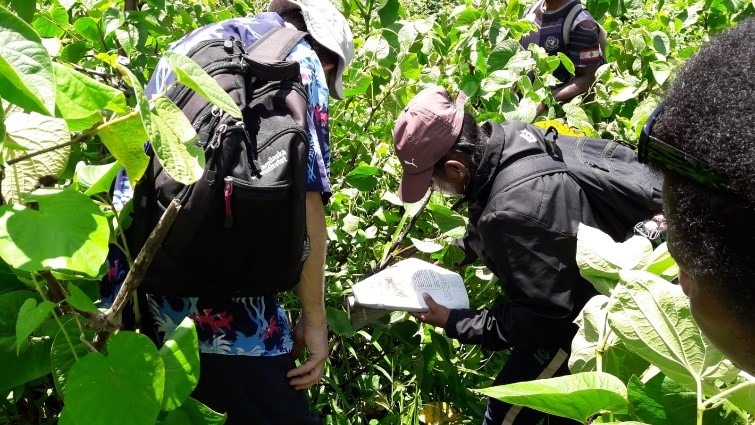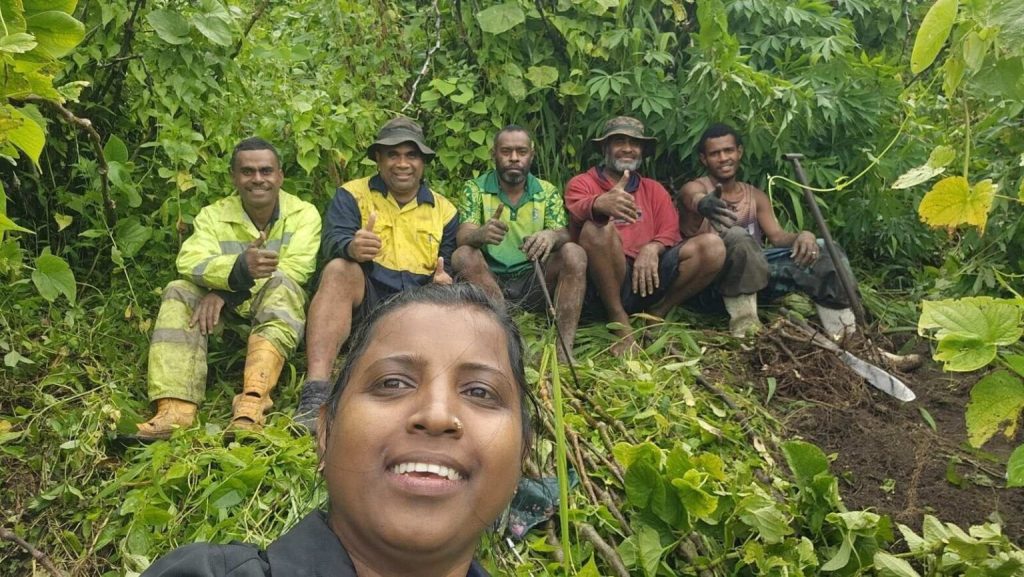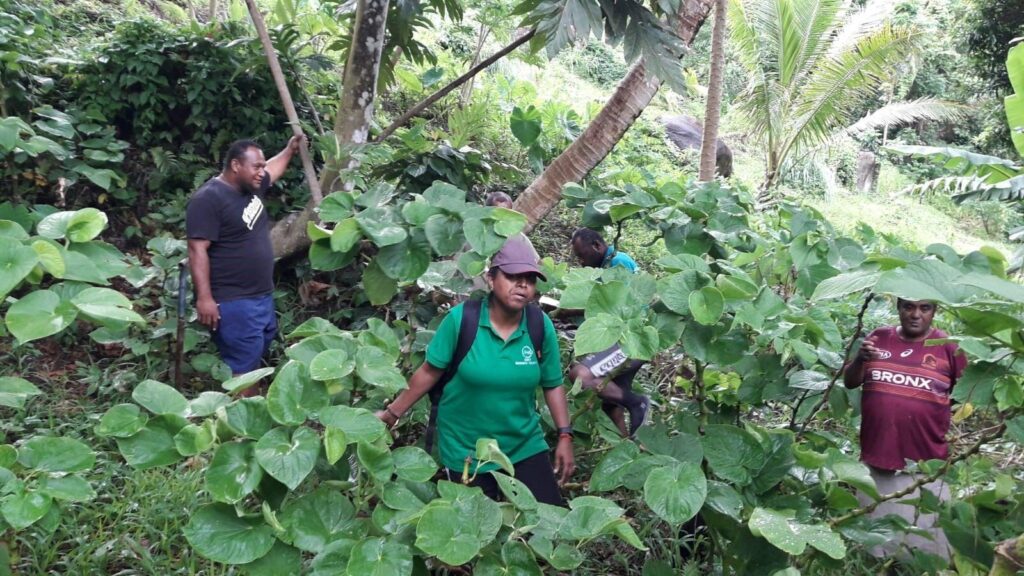Deepti Devi has been a member of a research team led by Prof. Pasinszki, conducting research across Kava-growing regions in Fiji.
Deepti's Science Fair
Deepti Devi has always had a keen interest in science. As a young girl, Deepti conducted simple experiments at home out of curiosity. This interest led her to pursue her studies and a career in teaching science.
Now, she’s pivoted from teaching to researching about kava as part of her Master’s by Research studies at the Fiji National University (FNU).
PHAMA Plus is collaborating with Deepti and FNU to research what influences the active chemical components of kava grown in Fiji, known as kavalactones.
Apart from her intensive lab work, Deepti is part of a team of FNU researchers on the ground, conducting research with her team members across kava growing regions in Fiji.
Findings from the research will add value to the current and future development of the kava sector in Fiji, and the Pacific with scientific data on the kavalactone content of different varieties, soil type, climatic conditions and peak age.
For this year’s International Day for Women and Girls in Science, we acknowledge her contributions and share her story:

Q&A with Deepti Devi
Q: Tell us a bit about yourself.
Deepti: I was born and raised in Daku, Wainikoro Labasa, north of Fiji. I overcame family challenges, including my mother’s illness to complete primary and secondary education. I was also privileged to have attained a scholarship from the University of the South Pacific for a Bachelor of Science in Mathematics and Chemistry. Juggling family and work, I pursued a teaching career and attained a Post Graduate Diploma in Chemistry. In 2022, I received a Higher Degree by Research (HDR) scholarship for a Master’s by Research to conduct kavalactone analysis in Fiji with support from PHAMA Plus in collaboration with the Ministry of Agriculture and Waterways and Fiji National University.
Q: What does your role involve in this research?
Deepti: Due to widespread kava adulteration, relying on market-sourced kava for research is unreliable. My role involves visiting kava farms, selecting samples from the 13 classified kava varieties in Fiji, bringing them to the lab, and conducting kavalactone analysis. With my supervisor’s assistance, we interpret results, create chemotype profiles, and determine relative kavalactone ratios for each kava variety.
Q: What’s it like being a woman in male dominated field?
Deepti: Being a woman in a male dominated field presents unique challenges. For instance, during one of my postgraduate units, we were asked to write a mini proposal, and when I was discussing about the idea of conducting kava research, some male students in the class laughed as I was a female and wanted to do research on kava which is also a male dominated industry. Therefore, gender bias and stereotyping is still an issue. I believe there is a need for us women to work to break barriers, promote diversity and contribute towards valuable perspective. It is important to acknowledge the achievements of women in this field and continue fostering an environment that will empower everyone regardless of gender.


Q: What are some of the challenges faced in your line of work and how have you managed to cope?
Deepti: My work primarily involves frequent field visits, extensive lab work, and data analysis, all while juggling the responsibilities of being a mother and wife. As a research student, commitment to reading literature and building my thesis is crucial.
Balancing personal and professional responsibilities presents a significant challenge. To overcome this, I rely on proper planning, delegation of duties and flexible working hours. At home, responsibilities are shared – my husband takes care of housework and our children when I’m out in the field, and my son handles his tasks independently.
In the lab, I assist my supervisor, Professor Tibor Pasinszki, with sample preparation and analysis, and is flexible with working hours, including weekends. During field visits, the PHAMA Plus National Facilitator, David Hickes has been providing valuable support in sample collection. This collaborative effort ensures a harmonious balance between my personal and professional life.
Q: Who has motivated, supported and encouraged you to come this far?
Deepti: As a hypothetical researcher, I accredit my success to a combination of understanding family members such as my husband, my child, parents, my siblings and other family members, a very supportive mentor, my supervisor and a network of friends. My supervisor – Professor Tibor has provided guidance and encouragement throughout my research, helping me navigate challenges in both field and lab work. He is never tired of motivating and encouraging me especially when I feel exhausted with the excessive work carried out. Supportive family members, especially my partner and my son who have played a crucial role by understanding the demands of my work and contributing towards the responsibilities of motherhood and domestic life. My colleagues and peers have always been the sources of motivation and encouragement by fostering a positive and empowering learning environment. My friends especially Nalini, Shiloh and others who have always fostered me towards this research by providing their expertise. Together, all these elements have a strong support system that is propelling me forward.
Q: Why did you choose to do what you do now?
Deepti: There has been a lot of kava adulteration going on in Fiji by the middleman, since it is very difficult to distinguish the kava from different cultivars and locality after it is dried and pounded. It was through personal experience, post COVID pandemic, my husband was unemployed therefore, he started a kava business and faced ava adulteration as a challenge. There is not much research done on the different cultivars of kava and locality so we wanted to create the chemotype profile along with its unique fingerprints so that even when the kava is dried, it can be identified. In addition, I feel the kava farmers are doing a lot of hard work and they do not get enough in return. Due to the lack of information on kavalactones, many shipments of kava are returned from overseas markets. Therefore, it is very important to educate farmers on the importance of kavalactone analysis in addition to the difference between various cultivars.
Q: What is your message to the young men and women in Fiji and the Pacific who are interested in following your kava research?
Deepti: To those young men and women in Fiji and in the Pacific intending to join science research, I would like to say:
Embark your expedition with a desire to do something inquisitive, as the kava research offers an exceptional prospect to reconnoiter the scientific, cultural and medicinal aspects of kava. Kava is one of the thriving industries in the Pacific therefore it requires a great deal of research. Recently, a lot has been said about kava being a potent drug in the field of nutraceuticals. In order to broaden your understanding, seek mentorship from experienced researchers for your guidance. Your contribution towards kava research will not only advance the scientific knowledge but also it will contribute to the sustainable development of the region.
-Ends-
For more information, please contact PHAMA Plus Country Manager – Navitalai Tuivuniwai at n.tuivuniwai@phamaplus.com.au
